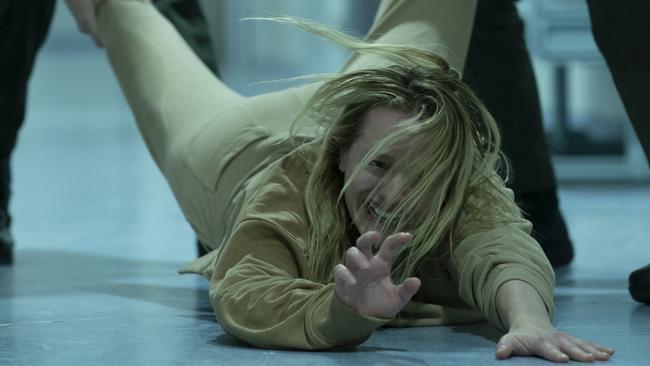
So says Cecilia Kass (Elisabeth Moss) in The Invisible Man, a modern take on HG Wells’s 1897 novel, written and directed by Australian filmmaker Leigh Whannell.
This goes to the core of any psychological thriller. We, the viewers, must be left in doubt as to whether the person seeing dead (or in this case invisible) people is in fact seeing them, or is deranged.
We must wonder whether they are shielding themselves from the knife or wielding it, whether they are victim or perpetrator. This tense uncertainty is why the recent TV series Unbelievable, starring Toni Collette and Merrit Weaver as the cops and Kaitlyn Dever as the sexual assault victim, or faker, worked so well.
It helps a lot if the actor involved does crazy well, and Moss, who we know from The Handmaid’s Tale TV series, does it superbly. That doesn’t mean Cecilia is mad, bad and dangerous to know, but nor does it rule it out.
This movie starts slowly but clicks into overdrive with an out-of-the-box scene at an upmarket restaurant between Cecilia and her sister, Alice (Australian actress Harriet Dyer), that will leave audiences gasping.
I will not say what happens, but this is the turning point of the movie. It is when you will start to think twice about Cecilia. Whannell sustains this doubt until the end, where there are two important twists to the plot. I think there is one significant way he could have improved this, which I will come to in a moment.
First, however, the backstory. The movie opens in San Francisco, now-ish, with Cecilia fleeing from the luxury estate of her husband, Adrian Griffin (Oliver Jackson-Cohen), a brilliant scientist who specialises in optics (as he does in the novel, though he has no wife).
Cecilia says he is a control freak who has been physically abusing her for years. She says he is desperate to have a baby, but adds that she has been using birth control pills in secret. We do not hear his side of this story.
She is picked up by her sister and driven to the house of a friend, police detective James Lanier (Aldis Hodge), who has a college-age daughter (Storm Reid). She moves in and never leaves the house.
Two weeks later her sister comes by with what she sees as life-saving news: Adrian is dead. He has committed suicide. Soon after, his lawyer brother Tom (New Zealand actor Michael Dorman) shows Cecilia police death scene photographs and ashes in an urn to prove it.
He also informs her that Adrian has left her millions, which will be paid in monthly instalments provided she is never charged with a criminal offence or declared insane.
It looks like she can start a new life. But then, as far as she is concerned, Adrian comes back. The first scene where she “sees” him is excellent. She in on the porch, it’s cold and her breath is in the air. So is someone else’s breath, right next to her.
From there Adrian stalks her. It starts out mild, with him pulling the doona off her sleeping body and stealing the architectural plans she prepares for a job interview; moves to threatening, with him sending out hostile emails in her name from her account; then escalates to violent. Knives become important. It’s worth remembering that Whannell made his name writing the Saw series of horror films for James Wan.
Moss is terrific as a woman who believes (or says she believes) her not-dead husband has come back, masked by an invisibility he has created, to kill her and anyone else who tries to stop him. No one believes her, and why would they.
So begins Cecilia’s descent into a dark place, of Adrian’s making, or hers. There are visits to hospital, where in a neat comic aside we see the Claude Rains Invisible Man we remember, swathed in bandages, and a mental asylum.
Last week I mentioned Harrison Ford looked lost at times when co-starring with a CGI dog in The Call of the Wild. Moss also has to act with thin air, fighting off a man she cannot see, and she does it convincingly. We feel he is there.
The improvement I mentioned would be to have filmed this in the first person, so that all we see is what Cecilia sees, or thinks she sees, or pretends she sees. As it’s not made from that perspective, as we can see what other characters are seeing, the inclination is to believe Adrian has returned.
What I did, however, was suspend that thought and, from that harrowing turning point at the restaurant, watched as though I was seeing it through Cecilia’s eyes only. The result was powerful; it changed the game.
Indeed, there is a chance, given what happens at the end, that this is what Whannell wants us to do; to think of Cecilia as the only teller of this story. If so, he has created something that echoes Wells’s novel (Griffin, no first name, is a psychopath) while adding to it in a quite remarkable, contemporary way.
The Invisible Man (M)
National release
★★★½
RELATED CONTENT: The List: David Stratton’s top 10 movies of 2019




“This is what he does. He makes me feel like I’m the crazy one.”